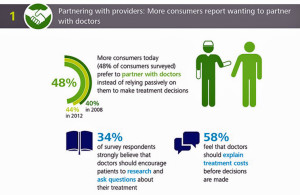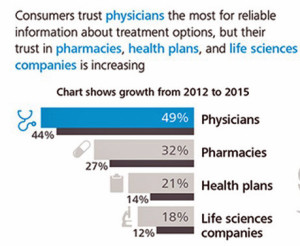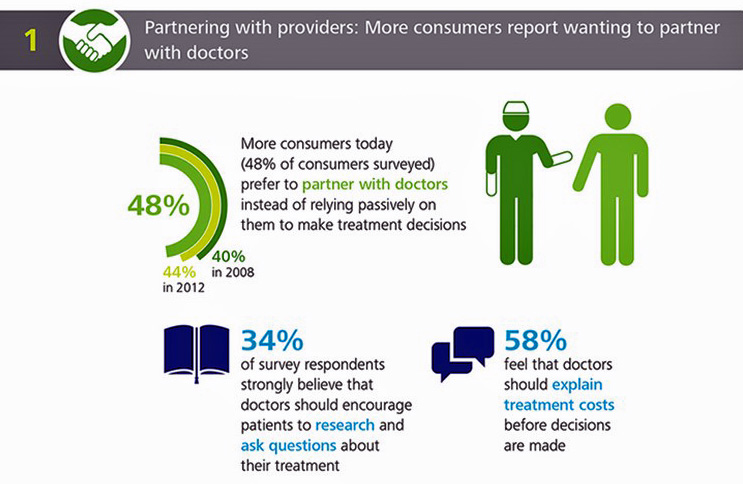 About one-half of consumers want to partner with doctors instead of allowing their physicians to make treatment decisions for them, according to a report from the Deloitte Center for Health Solutions, Health care consumer engagement: No “one-size-fits-all” approach. 1 in 4 people (25%) want to make treatment decisions themselves.
About one-half of consumers want to partner with doctors instead of allowing their physicians to make treatment decisions for them, according to a report from the Deloitte Center for Health Solutions, Health care consumer engagement: No “one-size-fits-all” approach. 1 in 4 people (25%) want to make treatment decisions themselves.
Call that clinical health engagement.
But even more people, 6 in 10, want to be financially-health engaged: 58% believe doctors should explain treatment costs before decisions are made, shown in the first chart. Most consumers would be comfortable talking about health care costs with doctors, and believe doctors should provide and explain the total cost of a treatment, procedure or test before receiving those services.
That person al physician is also the most trusted source for information about treatment options, a sentiment shared by one-half of consumers. Pharmacies rank second in reliable information about treatments (with 32% of consumers), followed by health plans (21%) and pharma and biotech (18%).
al physician is also the most trusted source for information about treatment options, a sentiment shared by one-half of consumers. Pharmacies rank second in reliable information about treatments (with 32% of consumers), followed by health plans (21%) and pharma and biotech (18%).
Deloitte gauged other aspects of health engagement in this report. Consumer interest in using technology to measure fitness and health improvement substantially grew from 17% of people in 2013 to 28% in 2015. That’s for health and wellness tracking.
Among people with chronic conditions, use of technology to monitor health conditions grew, as well, nearly doubling among patients from 22% to 39% of those managing a chronic illness.
Most people (70%) using technology to monitor a major chronic condition say it’s had at least a moderate amount of impact in helping them change health behaviors — 36% say a “great deal” of impact, and 34% saying a “moderate amount.”
Overall, people with major chronic health conditions index higher for health engagement activities than the general population, including seeking, among other offerings:
- Discounts on costs of getting care – 47% vs. 38% of all adults
- Information about quality when choosing health providers – 50% vs. 42%
- Information about costs when choosing providers or treatments – 48% vs. 42%
- Care plans to assist with chronic conditions, self-monitoring tools, etc. – 50% vs. 35%
- Premium discount for wearing a health monitoring device that sends personal data to a doctor or health plan – 40% vs. 34%
- Secure web sites to access records, schedule appointments, order Rx refills – 50% vs. 40%.
Deloitte points out in the report’s title that “no-one-size-fits-all.” Beyond one’s diagnosis with a chronic condition, there are other demographic, psychographic, and cultural characteristics that shape the new health consumer.
Deloitte based this report on a survey among 3,616 adult U.S. consumers in January and February 2015.
Health Populi’s Hot Points: The growth of so-called consumer-directed health plans — high-deductible plans with health savings accounts — compel people to think about quality and cost as they increasingly pay first-dollar coverage for health care services and products (THINK: prescription drugs). The growing numbers of engaged consumers, especially among people wishing to have health economic conversations with their doctors, is the data point that backs up the harsh household budget reality for this new healthcare consumer. In America, people spend $1 in every $5 on health care as a line item in the family budget. This is why I continue to advocate for the use of the noun “consumer” in U.S. health care. That Deloitte found one-half of U.S. adults want to partner with physicians, and one-quarter want to decide for themselves, only bolsters that grammatical fact.





 Thank you FeedSpot for
Thank you FeedSpot for